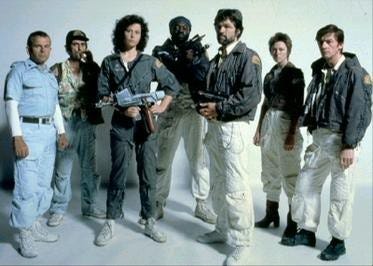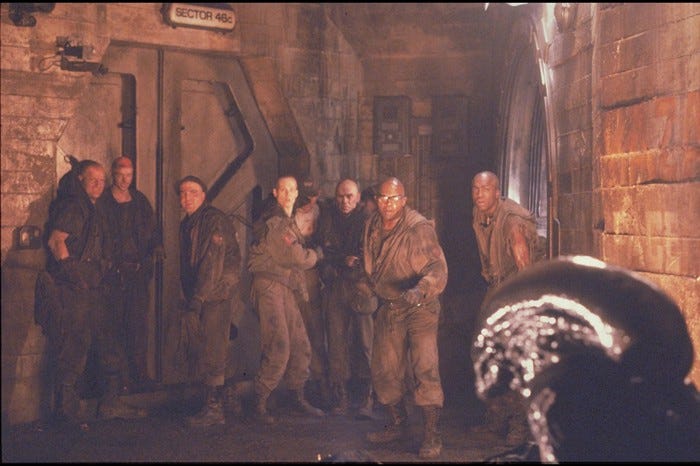The Alien Franchise and Feminism
The Alien franchise is known for two things: killer xenomorph aliens and Ellen Ripley.
The first four installments of the Alien franchise are synonymous with two things: killer xenomorph aliens and Ellen Ripley. The franchise was not feminist by design, but it did pave the way for other female leads in the science fiction and horror genres.
I first encountered Alien Resurrection (1997), the fourth installment in the franchise, in the late 90s. I was hooked. I then binge watched the first three installments and loved them all. Alien (1979) and Aliens (1986) are critically acclaimed, but let me be the first to tell you all four are worth the price of admission, even Alien 3 (1992).
Ellen Ripley, played by Sigourney Weaver, is the most badass female character imaginable. She’s tough, says what’s on her mind, is ready to die, and kills aliens.
She shows emotion, but she never backs down.
Sigourney Weaver, as a leading female character in sci-fi films, can be compared to Linda Hamilton as Sarah Connor in the Terminator franchise, and Milla Jovovich’s portrayal of Alice in the Resident Evil franchise. All are incredibly awesome protagonists.

Weaver and Ripley
Ellen Ripley defines the franchise, but the leading character wasn’t originally supposed to be a woman.
Ridley Scott, the creator of the Alien franchise, admitted the idea came from someone else. Scott recalled, “I think it was Alan Ladd [then president of 20th Century Fox] who said, ‘Why can’t Ripley be a woman?’ And there was a long pause, that at that moment I never thought about it. I thought, why not, it’s a fresh direction, the ways I thought about that. And away we went.”
Ellen Ripley was a rewrite. Partly a product of a gamble by a low budget movie, partly the recognition of Sigourney Weaver’s potential.
She was originally Martin Roby, a man described in the original screenplay as, “Executive Officer, cautious but intelligent, a survivor.”
The main character’s gender changed, but not much else. Dan O’Bannon, the writer of the screenplay, included, “The crew is unisex, and all parts are interchangeable for men or women.” However, that does not take away from the fact that the character was written with a man in mind.
After the critical acclaim of Alien, Weaver signed back on for Aliens. Acclaimed director James Cameron came on as the writer and director of the sequel. Cameron was no stranger to strong female characters, after his recent work writing and directing the widely successful movie The Terminator (1984).

Aliens was a sequel that was as widely successful as the first. Sigourney Weaver even received an Academy Award nomination for Best Actress.
Contrary to logic, the first draft of a third installment in the Alien franchise did not feature Weaver. The two male characters that survived the second film were the center of the plot.
In Alien 3, although Ripley dies at the end, she is brought back as a clone in the fourth installment aptly named Alien: Resurrection. In the end, the franchise finally understood Weaver’s worth.
There have been rumors circling for years that a fifth Alien movie would be made and that the story would center around Ripley’s character. However, in a June interview, Weaver said, “Maybe Ripley has done her bit. She deserves a rest.”

Feminism
The Alien franchise is not about feminism, but there are many moments throughout the movies where Ellen Ripley or another female character’s gender is the point of emphasis.
For example, Alien 3 begins with Ripley’s ship crash landing onto a prison planet populated by only men. Her gender comes up a lot.
Although the Alien franchise was not feminist by design, it does deserve some credit. Weaver was given the opportunity to play Ripley and she nailed the role. In every movie, Ripley is the strongest and most poised character on the screen.
Weaver set the tone for female leads in the franchise, and the trend continued with Prometheus (2012) and Alien: Covenant (2017). Both movies had female leads, not named Ellen Ripley.
The franchise benefited from the decision to cast Weaver as Ripley, as did audiences around the world.
Final Thoughts
In the future, cyborgs do not judge people based on their gender, big corporations paying for space missions consider everyone expendable, and xenomorph aliens kill without discrimination. We might be facing a brutal world.
Characters like Ellen Ripley are great examples of female strength. It doesn't take a man to defeat aliens. I hope our society gets closer to gender equality in time to save itself from the aliens.



